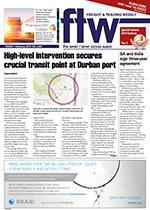South Africa’s economic outlook faces strong international and domestic headwinds – and the country is likely to remain one of southern Africa’s underperformers this year in terms of investment, exports and gross domestic product (GDP) growth. Chief economist for the Efficient Group, Dawie Roodt, refers to 2019 as the “year of living dangerously” for the South African economy. “The state-owned enterprises (SOEs) have been run into the ground by the cadres and gutted financially in recent years. The same goes for the state’s finances. Debt has become unsustainable and I can’t see how we are going to avoid a further downgrade,” comments Roodt. He also doesn’t believe there will be much investment in the country until after the elections, slamming the so-called political “good guys” for not speaking out enough last year and for following a populist policy in the run-up to the elections. “If the good guys really want to prove that they do want the best for the country, they will risk a confrontation with their political allies and a break with Cosatu must be at the top of the agenda,” Roodt says. “The reality is that a destructive government has caused immense damage to the SA economy and the same political force is likely to prevail after the election,” adds Roodt. Political analyst Daniel Silke shares this sentiment and points out that while the Ramaphosa administration “offers some hope of a future reversal of this depressing malaise”, there is still too much policy uncertainty to properly kick-start much-needed growth. “Yes, the country can keep itself above the recessionary red-line for 2019, but growth between 1%-2% will mean another year of underperformance – albeit at moderately better levels than 2018,” says Silke in a recent blog post, commenting that lack of clarity means investor suspicions. The two biggest issues for investors, says Silke, are a lack of clarity around the proposed Expropriation Without Compensation (EWC) Bill and concerns around the new Mining Charter “With substantial falls in mining production in recent years (and related job losses), the industry is shifting to new metals outside of the South African jurisdiction. Onerous ownership conditions are likely to prevent any real revival, and with it the chance to elevate mining away from its ‘twilight’ status,” he points out. Annabel Bishop, chief economist at Investec, agrees. “For South Africa, the deep decline expected by the International Monetary Fund (IMF) in metals prices is a negative for prospective growth. According to her, metals are among SA’s key exports and a slowdown in commodity prices would also negatively impact the rand, which is a commodity currency,” Bishop explains. Francois Stof berg, economist at Efficient Group, says that global investors are also experiencing an economic slowdown amid global trade wars and the looming spectre of Britain’s exit from the European Union. “By March, the Brits will be out of the European Union (EU). Our view is that the exit will occur, by hook or by crook. Getting there will, however, place a tremendous amount of pressure on both the UK and the EU (read dollar strength),” he says.
CAPTION
I can’t see how we are going to avoid a further downgrade. – Dawie Roodt

